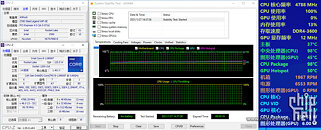Thursday, January 28th 2021

At Stock All-Core Boost, i9-11900KF "Rocket Lake" Hits 98°C with 360mm AIO CLC Under Stress
Intel's 11th Gen Core "Rocket Lake-S" processor is shaping up to be one hot chip. Enthusiasts on Chinese tech forum ChipHell with access to a Core i9-11900KF sample report, that when stressed at [apparently] stock settings, in which the processor hits its all-core boost frequency of 4.80 GHz, even a 360 mm all-in-one liquid CPU cooler struggles to keep the chip from hitting 100 °C, with core temperatures reaching 98 °C. The i9-11900KF comes with a disabled iGPU, which means all of its heat is generated by the core and uncore components of the GPU. AIDA64 was used, to apply multi-threaded stress on the processor (the burn-in test), while CPU-Z reports a core voltage of 1.401 V, it's not known whether this is a manual setting, the chip's VID, or whether the motherboard is trying to stabilize the 4.80 GHz clocks.
Sources:
9550pro (Twitter), ChipHell Forums, VideoCardz

91 Comments on At Stock All-Core Boost, i9-11900KF "Rocket Lake" Hits 98°C with 360mm AIO CLC Under Stress
Yes the news report is just that horrendously inaccurate I'd add and shouldn't of been given light of day on tpu.
10900K review: 54C, 85C no power limit under 120mm air
11900K leaked: 98C under 360mm AIO!1!1!1!
11900K review:
Starting to see a pattern here...
Also the title just completely taking the leaker's word on being "stock" is just irresponsible. Anyone with 2 brain cells who knows even a shred of how Skylake/Coffee/Comet Lake worked can tell that 1.4V isn't "stock all-core", at best terrible pre-release board firmware, at worst an intentional attempt at FUD.
Edit: Of course this could explain why the Integrated Graphics is being moved away from the Processor, to spread the heat distribution around.
Backporting Ice lake cores to 14nm is a joke and it's not even total backport.
Rocket Lake is a joke and if you really want Intel wait for Alder Lake, that will be a much much better and more efficient product
This isn't even about single thread performance for people remarking about that this is all core performance there is a difference you'd disable the extra cores and push single core frequency on a single core if that was your objective. Also you could technically test that on each core and determine which one has the best frequency and stability and assign the .exe to that specific core permanently with ImageCFG for the record though I haven't heard of anyone going to that extent and same is true of AMD chips.
Therefore i9-11900KF results:
Td = 98C – 37C = 61C
P = 250W
Your i9-10900K results
Td = 71C – 26C = 45C
P = 209W
In the end we are just comparing the efficiency of the 360 RAD coolers including how flat and good the interface is for the CPU hotspots. The other factor is just the CPU wattage which is just heat generation (watts are just watts). This whole article is basically a non-story!
It won't be long before we know how hot this chip runs. I am not optimistic because 250W PL2 is not something easy to cool. I assume Intel would have soldered this instead of using lousy thermal compound again.It is true that the 5800X runs very hot. But it is possible to undervolt it quite a fair bit and also lower the power fed to it, and it still retains the same performance, and in some cases that I heard, improve performance. The chip is being fed too much power in the first place.
On the other hand, Intel really pushed the 11900K to the max, just like they did with 10900K. So its expected to run much hotter. The fortunate thing is that the die itself is quite big, so contact with the IHS and heatsink is better as compared to the chiplet design used in the Ryzen 3000 and 5000 series. But hopefully Intel will not scrimp on contact with the IHS.